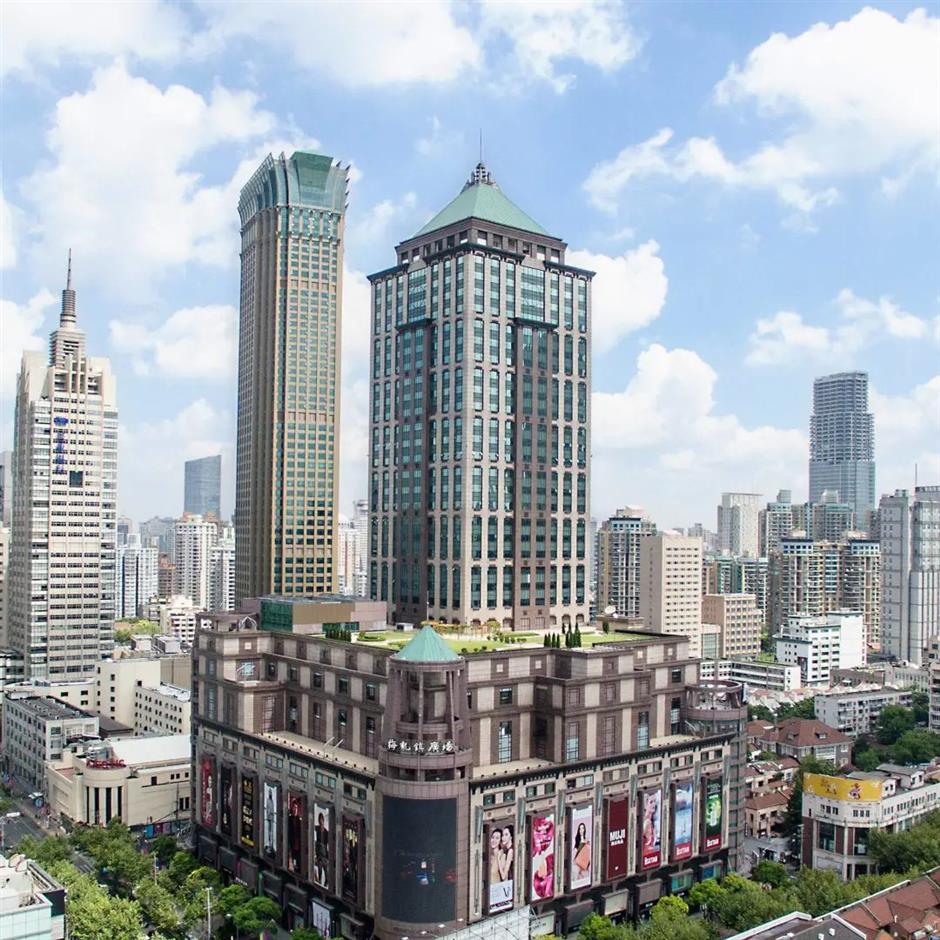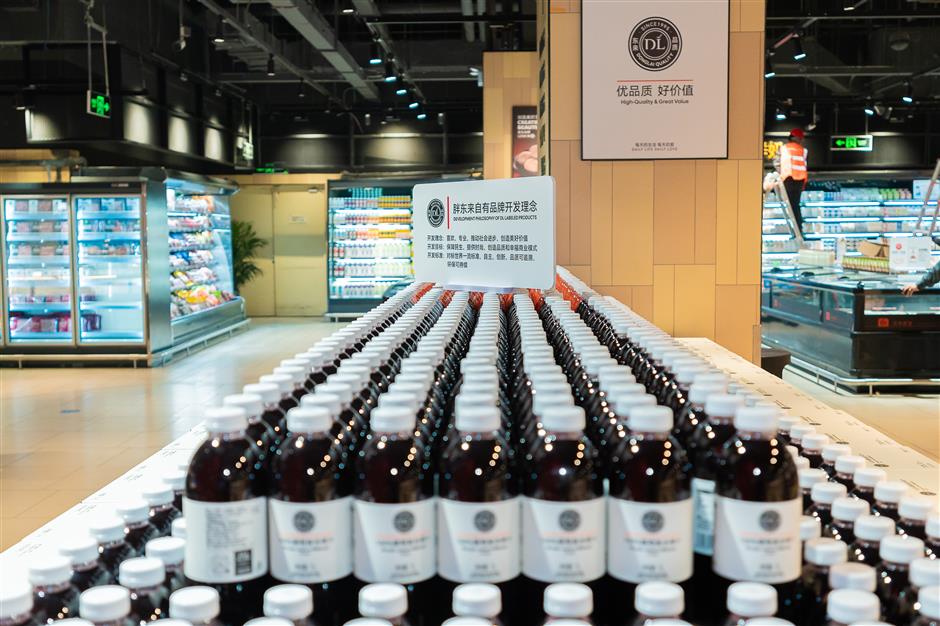
今日上海
在消费者精打细算的趋势中,零售商争相转型 - 2024年12月25日
Amid a trend of consumer penny-pinching, retailers are reinventing themselves

The Lady Huaihai was unveiled in October, hoping to offer not only lifestyle brands but also interior décor creativity and leisure activities for female customers.
The recent news that veteran downtown retailer Parkson Shopping Center renewed its long-term lease with property owner Shanghai Jiuhai Industrial Co took many by surprise in a year when retailers have been struggling with sluggish sales and many shops have closed.
Shanghai Nine Sea Parkson Plaza Co, an indirect subsidiary of the Malaysia-based department store operator Parkson Retail Group Ltd, announced it has signed a new 15-year lease for about 300 million yuan (US$41 million).
The shopping center on Huaihai Road said plans to introduce a food bazaar, open late night pubs and entertainment venues, and bring in more trendy fashion brands in efforts to entice consumers.
It's been a hard year for retailers. Retail sales in Shanghai in the first eight months of the year fell 3.3 percent. The "thrifty" mood has been blamed on a slump in the housing market, roll-on effects from earlier coronavirus shutdowns and weak consumer confidence about the state of the overall economy.
Is it too early to be optimistic about a rebound? The picture is mixed.
Retail sales in Shanghai in October rose 10 percent, but China sales nationwide in November missed analyst expectations with modest 3 percent growth from a year earlier, despite a big government push to encourage consumer spending.
What is clear is that a restructuring of the retail market is underway, with changes in business models and premises. The watchword for retailers is adaptation.
"Despite macroeconomic challenges, numerous brands are showing resilience by expanding and adapting to market changes," wrote James MacDonald, research chief for China at property firm Savills. "Key growth opportunities are emerging in niche subcategories, highlighting the resilience and potential within the sector."

Westgate Mall on Nanjing Road W closed down in summer, the site will be upgraded in the next few years.
With many landlords showing flexibility in lease renewals and major urban renewal and commercial district remodeling projects underway, the groundwork is laid for a changing retail sector to enter new era of profitability.
In July, the downtown Westgate Mall on Nanjing Road W closed, leaving many shoppers lamenting the loss of a prime shopping site well-known for its imported brands.
The site, according to a local district planning blueprint, will be upgraded with the addition of six or seven new floors and expanded retail, commercial and leisure functions.
While the churn of shops opening and closing in the city continues, retailers are becoming more inventive in attempts to boost foot traffic over the long run.
New store openings are targeting niche consumer groups.
Shanghai Lady Fashion Department Store, which rebranded itself as Lady Huaihai in October, now offers not only lifestyle brands but also interior décor creativity and leisure activities that make the shopping experience more pleasurable.
Will consumers take the bait?
Roxy Lu, who works at a local pharmaceutical company, said a shop like Lady Huaihai would not be a routine destination for her.
"I have little interest to show fancy installments and designer brands on my social media site," she said. "For me, it's convenient to shop at local stores around my home."
Lu is the kind of consumer that retailers are keen to cultivate.
Another project seeking to do that is the HAI550 mall that opened in August on Huaihai Road, which is sometimes likened to New York's Fifth Avenue. The site, which was a theater in the 1930s, a cinema in the 1950s and the world's first Barbie flagship store in 2009, has been repurposed.
The eight-floor center is hailed as China's first sustainable lifestyle mall, with recycled materials used in its construction and also in many of the goods for sale. The mall has set aside designated exhibition space for pop-up vendors and short-term art projects. The aim is to attract young shoppers who care about the environment and who want to shop in a place of distinctive personality.
The idea behind this and other similar transformations of traditional shopping is that physical retail space itself becomes an experience rather just a place to buy merchandise.
According to Neo Huang, China head of retail at commercial property and management firm JLL, new leases in the retail sector have come predominantly "from affordable dining, sportswear, streetwear brands, local designers' brands, and collectible toys stores."
JLL noted a shift towards more rational consumer behavior and brands that offer value for money. As the younger generation becomes the main consumer group, trendy fashion brands, sportswear and equipment, collectible toys and products related to popular animation, comics and games are expected to continue to gain popularity and drive store expansion.
But physical amenities aside, many retailers are also rediscovering the value of the old industry mantra: The customer always comes first.

Shanghai-listed superstore operator Yonghui is one of the chains to introduce some of Pangdonglai's home brand products in an effort to remodel its operations.
Pangdonglai, a retailer that operates 13 grocery outlets in central Chinese province of Henan, has become something of an industry role model for its excellent customer service, emphasis on work-life balance for employees and a profit-sharing plan that benefits both customers and staff.
This year, in swift response to consumer complaints, Pangdonglai paid out 8.8 million yuan in compensation to customers after a supplier was found to have violated food safety procedures.
Shanghai-listed superstore operator Yonghui consulted with Pangdonglai before remodeling dozens of its shops around the country, and it's also introducing some of Pangdonglai's home brand products.
One of its stores in Jinshan District of Shanghai is set to complete renovation work in mid-January and plans to add more fresh food and bakery items. It also has announced that customers won't have to slog through a long tour of the whole store to reach cashiers, and more employee benefits will be added.
German discount supermarket chain Aldi has been another successful example of adaptation, pouring its resources into Shanghai outlets instead of expanding to other parts of China.
In the past few years, it has stretched its footprint beyond just groceries to home cleaning and personal care items.
Shanghai-based supermarket chain Century Lianhua has cut its product line by about two-thirds, with plans to boost home-brand goods. It has also added smart check-out machines and delivery services for nearby communities.
Peng Jianzhen, president of the China Chain Store and Franchise Association, told a recent industry forum that shoppers are turning from mass market merchandise to more specialty offerings, particularly those with high value for money.
The blossoming of regional players shows a desire to cater to a smaller target of customers, who are more demanding than ever, said Rachel Lee, general manager of Kantar Worldpanel China. She added that that the key to success in current retailing is to build customer trust and loyalty.
Source: Shanghai Daily

